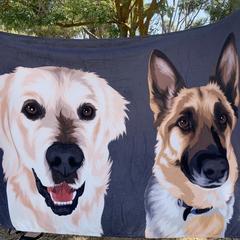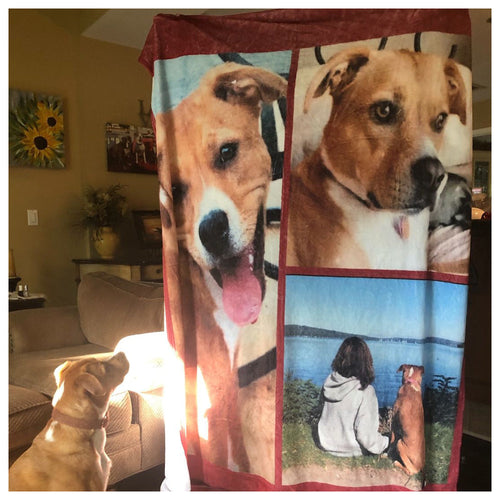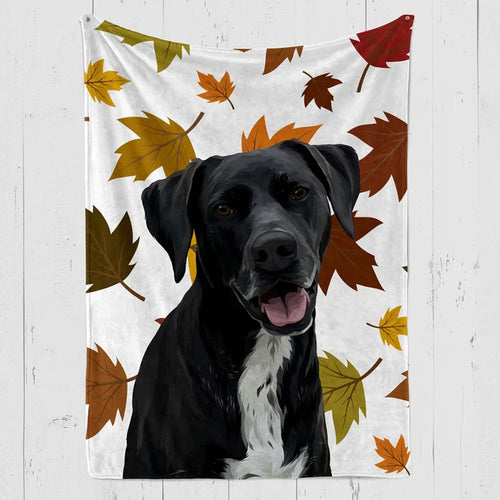If you've owned a dog for a while, you've probably noticed it jerk, twitch, or even move its legs in a running action while it sleeps. These amusing little habits can occasionally develop into pacing or even galloping. Many owners may then question, "Can my dog sleepwalk?"
This question doesn't have an easy solution. But first, let's explore what the scientific community knows about these behaviors and their causes.
What Do You Mean By Sleepwalking?
Sleepwalking is a behavioral problem that makes a person move around or carry out tasks while they are unconscious.
Despite its name, sleepwalking involves more than just the act of walking. Dog Walking is simply one of many complex processes and behaviors it can involve; it's not even the most obvious and obvious indication.
Human test participants allow us to learn a great deal about sleepwalking. All of our understanding of this illness, however, comes from humans.
Canines often make bad test subjects since they can't always express their feelings and opinions.
Main Reasons Behind Dogs Sleepwalking
Your pet may exhibit this behavior while sleeping for various causes, including sleep disorders, aging, seizures, or drugs your pet may have recently taken or been prescribed.
1. Aging
Degenerative brain problems brought on by aging may contribute to your pet's difficulty falling asleep.
2. Lack of Sleep
One of the causes of a dog sleepwalking is lack of sleep. Other sleeping disorders may develop when your canine friend is deprived of sleep for an extended period. Narcolepsy and cataplexy are two examples of its components.
3. REM Sleep Disorder
The same type of REM sleep that happens in humans also occurs in dogs. And under some conditions, when this occurs to our animal pals, they might act out their fantasy.
A dog with a REM sleep disorder may also howl, chew, bite, bark, chew, and even have episodes of sleep tremors.
Common Symptoms For The Sleepwalk Phenomena In Dogs
1. As a pet owner, if you too worry about your pet wandering here and there, especially during the night, then know that you aren’t the only one!
You can gently put your dog on its bed so that he can turn back to its normal behavior the next day.
2. Now, it is normal human tendency to question whether this is what we call dog sleepwalking. As per experts, this phenomenon is not at all relatable to sleepwalking in dogs.
3. Instead, dogs are in a still posture while they are sleepwalking. During such times, they tend to make movements like paddling their feet gently like they’re running or in an active motion.
4. It is obvious to compare this movement in dogs with their aging as it can be the result of a mental or psychological illness.Therefore, we suggest that if you see your dog imitating any of the following symptoms, don’t presume it to be signs of sleepwalking instantly.
5. They may be facing other symptoms, including senility, narcolepsy, or even cataplexy.
You must try to notice their behavior very closely if you really wish to understand the main reason behind this activity. Nowadays, people also use devices like dog activity trackers which really helps in such situations.
Common Sleep Disorders Mistaken for Dog Sleepwalking
Since studies suggest that dogs cannot sleepwalk, other diseases that may be causing these symptoms are typically to blame.
1. Neurological Disorders
A puppy may exhibit a range of odd behaviors if the brain and nerve system aren't functioning properly. The outcome of seizures is one example of a neurological condition that could make your dog pace about, lean against a wall, or express for no apparent reason while appearing to be asleep.
2. Sleep Disorders
Although dogs don't sleepwalk, they appear to have a few other sleep conditions that also affect humans. Narcolepsy and other conditions like insomnia can make your dog unusually sleepy and produce odd sleep patterns.
3. Cognitive Disorders
Some furry buddies may eventually see a deterioration in their mental abilities as they age. Sometimes this causes them to roam, act perplexed, or simply appear different from how they usually do.
You may mistake many of the symptoms for sleepwalking if you have one of these conditions. which, if not addressed right away, can all be quite serious and harmful to Fido's health.
Bring any apparent irregularities in your dog's sleeping to their veterinarian's attention as soon as you can. Additionally, always be cautious and get in touch with your dog's veterinarian if anything appears strange about him.
What to Do When Your Dog Exhibits Strange Sleeping Habits?
While your dog is sleeping, there are a few things that you may want to do to keep him safe. You can also do some things to help him sleep through the night more soundly. Among the finest actions to take are:
1. Make a cozy bed for your dog to sleep in.
Dogs with hip or joint issues may find it difficult to feel comfortable, which might interfere with their sleep patterns. Your dog may feel more secure in a comfortable bed, promoting restful slumber.
So that your dog is less likely to hurt himself at night, put his bed away from traffic. You don't want your dog to damage himself by falling down the stairs or bashing into a coffee table.
2. Make sure your dog is eating a healthy diet.
Ensure your dog receives a good diet because dietary shortages might interfere with sleep. Omega-3 fatty acid supplements for dogs may be a smart idea as they could aid in promoting healthy sleep habits.
3. Make sure your dog exercises plenty throughout the day.
Even if genuine sleep disorders like narcolepsy won't go away, exercise can help wear them out and encourage improved sleep habits. Just ensure your dog is in good enough shape to run marathons before you start doing so.
4. Above all else, inform your veterinarian.
You must take your dog in for a checkup because some sleep disorders might endanger their health and welfare. This will enable you to resolve any underlying issues swiftly.
Although it doesn't appear that dogs sleepwalk, they do many other unusual things while they're sleeping.
Do Dogs Experience Sleepwalking and Urination?

Yes, it is feasible for your dog to sleepwalk and urinate simultaneously. Even yet, it still happens very infrequently.
Additionally, when it does occur, particularly at night, urinating may not always be related to sleepwalking. It might be the result of incontinence.
Do Dogs Sleepwalk and Bark?
Yes, when a dog does this sleepwalking movement, it may bark. Barking may indicate that a dog is terrified of a threat that is occurring in its brain when it is asleep. It often responds as a result.
When your dog sleepwalks, you should look at where its tail is. The dog barks in response to its tail dropping between its legs, which represents fear. On the contrary, hand, if your dog barks in reaction and raises its tail over its body, it gets hostile.
Takeaway
It could be fun to watch a dog sleepwalk. To protect your dog's well-being, you must take additional care because it is unable to communicate its illness. The signs of sleepwalking might be difficult to distinguish from those of a seizure, and pet owners frequently do just that. If your dog is having seizures, it is advised that you visit a veterinarian every once. Do not underestimate sleepwalking, either. There's a chance that your dog will hurt themselves. Get your dog checked out and given the necessary care before things get out of hand so you can guarantee improved sleep for your dog.
Frequently Asked Questions
How frequent is this phenomenon of dogs’ sleepwalking?
Remember that canine episodes of sleepwalking are quite infrequent. Like with most other sleep issues, even though many dogs occasionally experience nightmares. If your dog sleepwalks, don't be alarmed; it's mostly harmless and doesn't signify any underlying medical issues.
How can I recognize sleepwalking in my dog?
Dogs rarely sleepwalk, but if you think yours could watch for symptoms like aimless wandering, unresponsive behavior, or uncoordinated behavior while dozing off. Consult a veterinarian if you have any worries so they can rule out any deeper health problems or strange sleeping habits.
What should I do if my dog starts to sleepwalk?
Don't worry if your dog sleepwalks; there's no immediate need to call the veterinarian. The majority of incidents are harmless and don't endanger your dog's health or well-being. You can, however, take certain measures to keep your dog safe if you're concerned that he might hurt himself.
Can dogs who sleepwalk be treated?
Given the paucity of current scientific studies on canine sleepwalking, offering a thorough technical response is challenging. Dogs may experience complex sleep disorders or atypical sleep behaviors due to neurological, psychological issues or psychological causes. More investigation is required to completely comprehend the reasons, methods, and potential remedies for canine sleepwalking.
Reference links:
- https://www.happytailsinc.com/do-dogs-sleepwalk/
- https://www.k9ofmine.com/can-dogs-sleepwalk/
- https://www.mypetneedsthat.com/sleep-walking-in-dogs/
- https://www.thegoodypet.com/can-dogs-sleepwalk
- https://www.cuteness.com/13709935/can-dogs-sleepwalk
Recommended Articles :
Latest Review on Woof Blankets
To have such a masterpiece by my side every day is a gift for me and my memories with Rex. Thank you WoofBlankets for such an opportunity to recreate his image on a blanket.Lara o’ Miguel US, California

COLLECTION WORTH EVERY PENNY
BEST SELLERS
-
Woofy Single Color Custom Pet Blanket
![Woofy Single Custom Pet Blanket – Woof Blanket]()
- -41%
BlanketsSHOP NOW- Regular price
- from $64.95
- Sale price
- from $64.95
- Regular price
-
$109.95 - Unit price
- per
Sold out -
Exclusive Christmas Custom Pet Blanket
![Exclusive Custom Pet Blanket]()
- -39%
BlanketsSHOP NOW- Regular price
- from $69.95
- Sale price
- from $69.95
- Regular price
-
$114.95 - Unit price
- per
Sold out -
Christmas Custom Pet Blanket
![Christmas Custom Pet Blanket - Custom Dog Blankets]()
- -40%
BlanketsSHOP NOW- Regular price
- from $69.95
- Sale price
- from $69.95
- Regular price
-
$115.95 - Unit price
- per
Sold out -
Watercolor Pet Portraits
![]() SHOP NOW
SHOP NOW- Regular price
- from $59.95
- Sale price
- from $59.95
- Regular price
-
- Unit price
- per
Sold out -
Woofy Christmas Custom Dog Blanket
![Woofy Christmas Custom Dog Blanket]()
- -39%
BlanketsSHOP NOW- Regular price
- from $69.95
- Sale price
- from $69.95
- Regular price
-
$114.95 - Unit price
- per
Sold out -
Modern Pet Owner Portrait
![]()
- -32%
CanvasSHOP NOW- Regular price
- from $84.95
- Sale price
- from $84.95
- Regular price
-
$124.95 - Unit price
- per
Sold out -
Woof Splash Custom Pet Blanket
![Woof Splash Custom Pet Blanket]()
- -39%
BlanketsSHOP NOW- Regular price
- from $69.95
- Sale price
- from $69.95
- Regular price
-
$114.95 - Unit price
- per
Sold out -
The Admiral - Custom Pet Portrait
![The Admiral - Custom Pet Portrait Online]()
- NEW
- -25%
CanvasSHOP NOW- Regular price
- from $59.95
- Sale price
- from $59.95
- Regular price
-
$79.95 - Unit price
- per
Sold out -
Wings of Loyalty - Custom Pet Portrait
![]()
- NEW
CanvasSHOP NOW- Regular price
- from $59.95
- Sale price
- from $59.95
- Regular price
-
- Unit price
- per
Sold out -
Pet Memorial Custom Photo Collage Blanket
![Personalized pet memorial quilt with photos]()
- -41%
BlanketsSHOP NOW- Regular price
- from $64.95
- Sale price
- from $64.95
- Regular price
-
$109.95 - Unit price
- per
Sold out -
Celestial Paws - Custom Pet Portrait
![]() CanvasSHOP NOW
CanvasSHOP NOW- Regular price
- from $59.95
- Sale price
- from $59.95
- Regular price
-
- Unit price
- per
Sold out -
The Loyal Soul - Custom Pet Portrait
![]()
- NEW
SHOP NOW- Regular price
- from $59.95
- Sale price
- from $59.95
- Regular price
-
- Unit price
- per
Sold out -
Cartoonized Pet Portraits (New)
![Cartoonized Pet Custom Portraits Online]()
- -36%
SHOP NOW- Regular price
- from $59.95
- Sale price
- from $59.95
- Regular price
-
$93.95 - Unit price
- per
Sold out -
The French Sailor - Custom Pet Portrait
![]()
- -25%
CanvasSHOP NOW- Regular price
- from $59.95
- Sale price
- from $59.95
- Regular price
-
$79.95 - Unit price
- per
Sold out -
The Policeman - Custom Pet Portrait
![]()
- NEW
- -25%
CanvasSHOP NOW- Regular price
- from $59.95
- Sale price
- from $59.95
- Regular price
-
$79.95 - Unit price
- per
Sold out -
The General - Custom Pet Portrait
![]()
- NEW
- -25%
CanvasSHOP NOW- Regular price
- from $59.95
- Sale price
- from $59.95
- Regular price
-
$79.95 - Unit price
- per
Sold out -
Woof Love Custom Pet Blanket
![Woof Love Custom Pet Blanket]()
- -39%
BlanketsSHOP NOW- Regular price
- from $69.95
- Sale price
- from $69.95
- Regular price
-
$114.95 - Unit price
- per
Sold out -
Summer Time Custom Pet Blanket
![Summer Time Custom Pet Blanket]()
- -39%
BlanketsSHOP NOW- Regular price
- from $69.95
- Sale price
- from $69.95
- Regular price
-
$114.95 - Unit price
- per
Sold out -
The Ambassador - Custom Pet Portrait
![The Ambassador - Custom Pet Portrait Online]()
- NEW
- -25%
CanvasSHOP NOW- Regular price
- from $59.95
- Sale price
- from $59.95
- Regular price
-
$79.95 - Unit price
- per
Sold out -
Fall In Love Custom Pet Blanket
![Fall In Love Custom Dog Blanket]()
- NEW
- -39%
BlanketsSHOP NOW- Regular price
- from $69.95
- Sale price
- from $69.95
- Regular price
-
$114.95 - Unit price
- per
Sold out -
The Classy Lady - Custom Pet Portrait
![The Classy Lady]()
- NEW
- -25%
CanvasSHOP NOW- Regular price
- from $59.95
- Sale price
- from $59.95
- Regular price
-
$79.95 - Unit price
- per
Sold out -
The Duke - Custom Pet Portrait
![The Duke - Custom Pet Portrait]()
- NEW
- -25%
CanvasSHOP NOW- Regular price
- from $59.95
- Sale price
- from $59.95
- Regular price
-
$79.95 - Unit price
- per
Sold out -
Dog In Suit- Custom Pet Portrait
![Dash Dog In Suit- Custom Pet Portrait Online]()
- NEW
- -25%
CanvasSHOP NOW- Regular price
- from $59.95
- Sale price
- from $59.95
- Regular price
-
$79.95 - Unit price
- per
Sold out -
The Princess - Custom Pet Portrait
![]()
- NEW
- -25%
CanvasSHOP NOW- Regular price
- from $59.95
- Sale price
- from $59.95
- Regular price
-
$79.95 - Unit price
- per
Sold out -
Modern Pet Portrait with One Mug
![Modern Pet Portrait with One Mug]()
- -25%
Print MaterialSHOP NOW- Regular price
- from $99.95
- Sale price
- from $99.95
- Regular price
-
$133.95 - Unit price
- per
Sold out -
The Aristocrat - Custom Pet Portrait
![The Aristocrat - Custom Pet Portrait At Best Price]()
- NEW
- -25%
CanvasSHOP NOW- Regular price
- from $59.95
- Sale price
- from $59.95
- Regular price
-
$79.95 - Unit price
- per
Sold out -
Single Color Custom Blanket with 1 Mug
![Single Color Custom Blanket with 1 Mug]() BlanketsSHOP NOW
BlanketsSHOP NOW- Regular price
- from $99.95
- Sale price
- from $99.95
- Regular price
-
- Unit price
- per
Sold out -
Single Color Custom Blanket with 2 Pillows
![Single Color Custom Pet Blanket with 2 Pillows]()
- -21%
BlanketsSHOP NOW- Regular price
- from $99.95
- Sale price
- from $99.95
- Regular price
-
$125.95 - Unit price
- per
Sold out -
The Dog in Suit Custom Pet Mug
![]()
- -20%
MugsSHOP NOW- Regular price
- $39.95
- Sale price
- $39.95
- Regular price
-
$49.95 - Unit price
- per
Sold out -
Angel Custom Pet Mug
![]()
- -20%
MugsSHOP NOW- Regular price
- $39.95
- Sale price
- $39.95
- Regular price
-
$49.95 - Unit price
- per
Sold out -
This Human Belongs To - Custom Pet Mug
![]()
- NEW
- -20%
MugsSHOP NOW- Regular price
- $39.95
- Sale price
- $39.95
- Regular price
-
$49.95 - Unit price
- per
Sold out -
It's Not Dog Hair Custom Pet Mug
![]()
- NEW
- -20%
MugsSHOP NOW- Regular price
- $39.95
- Sale price
- $39.95
- Regular price
-
$49.95 - Unit price
- per
Sold out -
My Dog Is My Valentine Custom Pet Mug
![]()
- NEW
- -20%
MugsSHOP NOW- Regular price
- $39.95
- Sale price
- $39.95
- Regular price
-
$49.95 - Unit price
- per
Sold out -
3 Photos With Message Custom Pet Mug
![]()
- NEW
- -20%
MugsSHOP NOW- Regular price
- $39.95
- Sale price
- $39.95
- Regular price
-
$49.95 - Unit price
- per
Sold out -
My Valentine Has Four Legs- Personalized Mugs
![]()
- NEW
- -20%
MugsSHOP NOW- Regular price
- $39.95
- Sale price
- $39.95
- Regular price
-
$49.95 - Unit price
- per
Sold out -
Dog Mamma Custom Pet Coffee Mug
![]()
- -20%
MugsSHOP NOW- Regular price
- $39.95
- Sale price
- $39.95
- Regular price
-
$49.95 - Unit price
- per
Sold out -
Uncle Sam - Custom Pet Portrait
![]()
- NEW
- -25%
CanvasSHOP NOW- Regular price
- from $59.95
- Sale price
- from $59.95
- Regular price
-
$79.95 - Unit price
- per
Sold out -
The Revolutionary Emperor - Custom Pet Portrait
![]()
- NEW
- -25%
CanvasSHOP NOW- Regular price
- from $59.95
- Sale price
- from $59.95
- Regular price
-
$79.95 - Unit price
- per
Sold out -
The Princess Paws - Custom Pet Portrait
![]()
- -25%
CanvasSHOP NOW- Regular price
- from $59.95
- Sale price
- from $59.95
- Regular price
-
$79.95 - Unit price
- per
Sold out -
The Dark Crusader Knight - Custom Pet Portrait
![]()
- -25%
CanvasSHOP NOW- Regular price
- from $59.95
- Sale price
- from $59.95
- Regular price
-
$79.95 - Unit price
- per
Sold out
































































